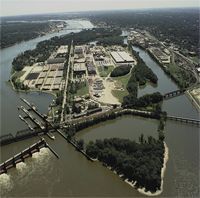December 17, 2014 – Colonel Elmer Speights, Jr., Garrison Commander (GC) of the Rock Island Arsenal, provided an overview of base operations to the Bi-State Regional Commission. Colonel Speights manages services and facilities for the 950 acre Arsenal Island, which includes 336 buildable acres with 141,000 square feet of “move in ready” administrative space, and 310,000 square feet of expansion office & warehouse space. Colonel Speights reported the Arsenal is working towards energy self-sufficiency or “net zero.” They are replacing coal-fired energy plants with natural gas and expanding the use of hydroelectric power.
The regional reach of the Arsenal may also be demonstrated through the distribution of the employees shown in following percentages of workers from each county in the region.
Illinois: Iowa:
Rock Island 41.5% Scott 44.5%
Henry 4.5% Muscatine 0.5%
Mercer 4.0% Clinton 1.5%
Whiteside 0.5% Jackson 0.5%
Knox 0.5% Cedar 0.5%
Jo Davies 1.0% Dubuque 0.5%
The Arsenal is the largest local employer in the region with 4,958 civilian, 1,021 military, and 691 contracted employees. The employment impact of the Rock Island Arsenal is over 14,000 community jobs. Salaries on the Arsenal average $74,823, and the local economic impact of the Rock Island Arsenal is over
$1 billion per year.
Major General Kevin O’Connell is the Commanding General of Army Sustainment Command on the Rock Island Arsenal and is considered the Senior Commander for Rock Island Arsenal. Major General O’Connell is the Army’s designated representative to the community and elected officials. Command Sergeant Major James Spencer is the primary advisor to Major General O’Connell and is responsible for community well-being. Command Sergeant Major Melissa Judkins is the primary advisory to Colonel Speights and is responsible for Arsenal morale and welfare.
The Rock Island Arsenal houses five commands that reach 40 states and19 countries. The commands include:
- Army Sustainment Command
- Joint Munitions Command
- Army Contracting Command
-
 First Army
First Army - Army Corps of Engineers
Army Sustainment Command (ASC) provides globally responsive strategic logistics capability and material readiness to enable commanders in combat to conduct the full range of military operations and ensure Army readiness. ASC has a presence in 19 countries and 32 states and controls a $5.7 billion budget.
Joint Munitions Command (JMC) provides America's Joint Forces with ready, reliable, and lethal munitions at the right place and time, in a cost effective manner, to enable successful military operations. Their goal is to provide conventional munitions for America’s warfighters in addition to world-class global logistics. The JMC stockpiles $61 billion of munitions and conducts 135,000 inspections per year. They distribute the equivalent of 11,000 containers per year for training and sustainment and control a $2.3 billion budget.
Army Contracting Command Rock Island provides global contracting support to America’s warfighters to support of the warfighter through the highest quality contracting solutions. Army Contracting Command manages 616 contracts.
 First Army advises, assists, and trains reserve units during pre-mobilization periods to provide trained and ready forces in support of joint, combined, interagency, and active Army Forces.
First Army advises, assists, and trains reserve units during pre-mobilization periods to provide trained and ready forces in support of joint, combined, interagency, and active Army Forces.
The Rock Island District Army Corps of Engineers is also housed on the Arsenal. Their workforce employs experts in a variety of professions across the district’s 78,000 square miles. These include lock operators, mechanics, rangers, engineers, surveyors, biologists, realty, and legal staff. They have approximately 850 employees with two thirds working at 27 different field operating sites and the remaining work in the Clock Tower complex on the Arsenal.
The Joint Manufacturing and Technology Center (JMTC) offers unique capability to fill multiple roles and responsibilities in rapid response to the National Security Strategy. JMTC serves as a vital link in the national defense structure, providing manufacturing, supply, and technical support services for the Joint Services and allies in all national emergencies and contingency operations. JMTC also partners with the private sector in the region to develop new manufacturing technologies.


